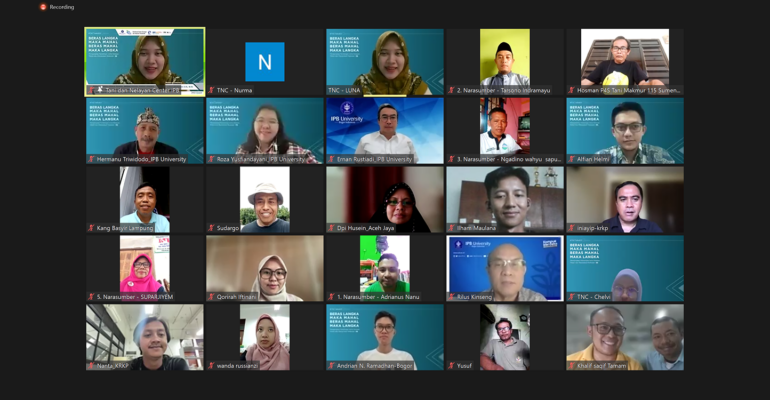This is how TNC IPB University listens to farmers’ views on the issue of rising rice prices

The Farmers and Fishermen Centre (TNC) IPB University held a Webinar Series TNCTalksE01 themed “Rare Rice is Expensive, Expensive Rice is Rare: Revealing the Views and Expectations of Farmers and Rural Communities” on Friday, 8/3 through the Zoom Meeting platform and YouTube streaming.
TNCTalksE01 Webinar Series is one of the initiatives of TNC IPB University in supporting farmers and fishermen of the archipelago. The event, which was attended by 101 participants, became an important momentum in strengthening collaboration between TNC IPB University, farmers and various other parties in order to improve the welfare of farmers amid the issue of scarcity and rising rice prices.
Chairman of TNC IPB University, Prof Hermanu Triwidodo welcomed this event by thanking various parties who supported the success of the event. In addition, he emphasised the importance of voicing and listening to the views and hopes of farmers on the issue of scarcity and rising rice prices.
“TNC, which is part of IPB University, strives to glorify the farmers and fishermen of the archipelago, through the principles of diversity and the application of ecological agriculture, wants to voice, listen and inform the real feelings and hopes of farmers regarding the increase in rice prices,” said Prof Hermanu.
He continued, the webinar is a very useful discussion forum to listen to various voices from farmers, academics and agricultural practitioners. “Through open dialogue, this event is expected to find various solutions to maintain a balance between rice prices, agricultural sustainability and farmers’ welfare,” said Prof Hermanu.
IPB University’s Vice Rector for Research, Innovation and Agromaritime Development, Prof Ernan Rustiadi emphasised IPB University’s commitment in supporting farmers and rural communities through TNC IPB University and various other initiatives.
The farmers also provided their experiences and views regarding the rice price situation. They said that the increase in rice prices has benefited farmers, but there are still concerns regarding price stability and government policies.
“The current rice price value is acceptable to farmers, but it must also be followed by the price of grain. When the price of rice rises and the price of grain falls, it is not the farmers who enjoy it,” said Rum Zaenab, a farmer from Tuban, East Java.
Meanwhile, academics discussed the dynamics of rice production, agricultural policy, and the challenges in maintaining a balance between the needs of consumers and producers. In addition, the discussion also highlighted the need for policies that favour farmers, both in terms of grain prices and subsidised fertiliser support.
“The price of rice at the consumer level is not matched by efforts to minimise production costs at the farm level. Related to the cost of production, such as expensive, scarce and limited fertilisers, there must be a government role in reducing production costs. If rice is cheap, then production costs must also be cheap,” said Dr Alfian Helmi, Assistant Director of Strategic Studies at IPB University.
The event also presented seven farmers as resource persons from various regions in Indonesia, such as Papua, East Nusa Tenggara (NTT), East Java, Central Java and Lampung. In addition, this event also presented academic representatives from IPB University, namely Prof Suryo Wiyono as Professor of the Faculty of Agriculture at IPB University. (Nurma/Lp) (IAAS/RUM)



